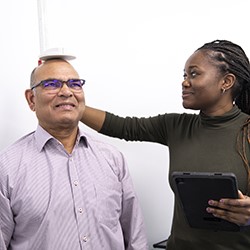All health and care research studies are designed differently, depending on what is being researched.
Find out more about what you can expect before, during and after taking part in a study on this page.
Essential information to know before you get started
How studies are regulated
Regulation around health and care research is tight. Rules are there to ensure that every phase of a study is run safely. Read more about how studies are regulated, approved and funded in the UK.
Who can take part
Everyone can take part in research. You don’t always need to be affected by the condition that is being researched to get involved. In many cases, you can take part in research if you have an unrelated health condition, or no conditions at all. Find out more about who can take part.
Giving your consent
Giving consent means giving your permission to take part in research. Find out what giving consent means and how it works.
Practical information
You may wish to consider some key practical questions about whether taking part in research is right for you.
As every study is different, there will rarely be a one-size fits all approach. This is why, if you're interested in taking part in a study, it’s important that you contact the study team to find out more. They’ll be happy to talk you through what’s involved.
Research can happen in lots of places: at an NHS hospital, GP clinic or health centre. Or at a university or research institute, in a care home, or in some cases in your own home.
What the study involves will often determine where it will take place. For more on the practicalities, read about our frequently asked questions.
There is no single answer for this. Some studies are online and take a few minutes to complete. Others take longer periods of time and require more involvement.
It’s important to decide what time you could set aside to help, and then find studies that work for you.
Most research studies in the NHS rely on volunteers to participate. Most studies on this website are based in the NHS. You may be reimbursed your travel expenses so it's worth talking to the study team about what financial reimbursements are available.
What happens during and after a study
Before you take part in research it’s important you understand what happens during and after a study. We have provided some general guidance below. But, as there are many different types of health and care research - it’s important you speak to the study team to get specific details for your study.
During a study
Regular tests and side effects
If you are taking part in a trial investigating a new treatment, researchers will want to carry out regular tests to find out how your treatment is working. This includes any side effects you may be experiencing. They will ask you questions about any new symptoms, including psychological and physical health symptoms.
The type and frequency of the tests will vary according to the research you’re taking part in so be sure to ask what’s involved.
You may also be asked to fill out questionnaires or keep a diary. It might also mean going to your hospital or GP more often. So bear this in mind before you agree to take part.
Support for you and your family
Researchers may also look at the wider effects a treatment has on your “quality of life”. This means they may ask if you can take part in your usual day-to-day activities, or if you need any extra help around the home or to look after your family.
Who is part of the research team that will support me?
Research nurse
The role of the research nurse is wide-ranging. It could include carrying out follow-ups, collecting data, maintaining research files, or managing consent from participants to take part.
Principal Investigator
A principal investigator is the healthcare professional who leads a study at a particular hospital, GP practice or other healthcare setting. They will look after the rights, safety and wellbeing of the people taking part in the study and ensure the results of the study are credible and accurate.
Chief Investigator
The Chief Investigator oversees the whole project. This role could be carried out by a doctor, dentist, nurse or pharmacist – who takes primary responsibility for the study. They design, conduct and report on the findings of the study.
What can I do if I have a question or concern about a study?
Your research nurse or doctor looking after you on your study should be the first point of contact for any questions or concerns you have. If these are not resolved, you can ask to be put in touch with the study's principal investigator or chief investigator.
You might also want to raise any questions about your health or care with your GP or other clinician looking after your routine care.
You can choose to leave a study at any time, without giving a reason and without it affecting the routine care you receive.
All studies available on Be Part of Research are regulated by the Health Research Authority. They protect the interests of research participants and the public. There is information on how you can raise concerns with them on their website.
If you have feedback or concerns about the Be Part of Research website or the volunteer service, please let us know.
After a study
How will my information be used?
If you take part in a research study, the research team will collect information as part of that particular study.
This information is held securely by the research team. Any information that is collected about you will be kept confidential, in the same way as your medical records.
So, this means that:
- researchers cannot tell anyone that you are in the study without asking you first
- if your GP, doctor or consultant is not the person who approached you about the study, it can be helpful for them to be told you are taking part in a study. Your GP is responsible for your day-to-day healthcare, but they can only be told with your permission
- the results are usually published after the study has finished and are often presented at conferences. No names or any information that can identify you will be used in any reports about the study
How will study results be used?
At the end of a study, researchers will publish the results, regardless of what they show. The results should be made available to everyone who took part, if they want them. The results will never show personal identifiable data from the people who took part.
The Department of Health and Social Care (DHSC) and the National Institute for Health and Care Research (NIHR) insists on publication of the results for all studies that they fund.
We also publish the results of all the research we fund in the NIHR Journals Library. However, as some studies can run for many years, it may be some time before the results are known.
Continuing your treatment
If you are having a new treatment as part of a study, you may want to continue that treatment after the study ends. But in practice, it may not always be possible for you to do this.
It may be some time before a new treatment is provided by the NHS. While in some cases, new treatments are not made available on the NHS. In this scenario, you would be given the standard treatment for the condition you have.
In some circumstances you may be able to buy the new treatment on a private basis. For example, if the drug has a licence, but is not available on the NHS.
How is it decided whether to make a treatment available?
When a study starts it’s impossible to be certain about whether the test drug or device will be made available on the NHS following the study.
The role of the National Institute for Health and Care Excellence (NICE) is to recommend whether the NHS should buy new and existing treatments. It makes these decisions based on how well a treatment works and if it represents value for money. Research is always needed to prove this. Sometimes, treatment costs only become clear after a study has finished.
Patients can find out more about NICE’s public involvement work and how it's used to develop new medicines and services.
How studies are designed
There are many ways to design and run a study, depending on what’s being tested. However, health and care research studies are always carefully designed to minimise the risks and maximise the benefits to all who take part, whatever treatment people receive. You can always speak to the study team if you want more information.
For studies researching new treatments, here are some common ways in which they may be designed. Other types of research - for example studies looking for better ways to improve diagnosis, prevent ill health (e.g. vaccines), or medical technology - will use different types of design.
In ‘randomised’ trials, you’ll be allocated to one or more groups. You’ll be allocated at random, usually with the help of a computer program. You might be in the control group. Researchers run these trials as they give reliable results.
What does it mean to be part of a control group?
Depending on the type of study, people in the control group either receive the standard treatment used for the condition, a placebo, or may not be given any treatment at all. Placebos are similar but inactive versions of the drug or treatment being tested.
People in the control group are an extremely important part of the study. The results from this group are needed to compare with the results of the test treatment - to see which works best.
Don't forget, the treatment being tested may be no better than the control, which is why the trial needs to be done.
In a blind trial, researchers won’t tell you which treatment you are getting. You could be getting the new treatment. Or you could get a standard treatment, or a placebo. You will be monitored in the same way, no matter what you’ve been given.
Blind trials are important because they offer reliable results. Researchers design blind trials because if you knew which treatment you were getting, it could influence how you feel, or how you report your symptoms.
It’s not always possible to have a blind trial, as the treatment being tested might be too obvious. In a blind trial the treatments need to look exactly the same.
In a double-blind trial, neither you or the researchers know which treatment you're receiving. You will be allocated a number at random. Usually, this is done by a computer. These numbers are also allocated to the treatment and this is kept secret until the end of the trial.
You can only have a double-blind trial when both the treatment and the effects aren’t very obvious.
How studies for new treatments are made safe
New treatments, or new uses for existing treatments, are tested in various stages – also known as ‘phases’. This helps establish what becomes a new medicine and what doesn’t.
Before being given to people for the first time, all drugs are checked for safety in animals. Then there are a number of different phases of clinical trials:
- Phase 1 trials involve a relatively small number of people
- Phase 2 trials are used to find out whether a drug works, whether it’s safe and what the side effects are
- Phases 3 and 4 trials involve larger numbers of people and are designed to assess how the treatment works, compared with existing treatments. They also continue to assess side effects and risks
Not everyone receives a new treatment in a health and care research study. Sometimes studies need to compare a new treatment with the standard treatment already in use, if there is one. It's worth knowing:
- some people in a study will receive the standard treatment. But until the results of the study are analysed, no one will know which treatment is better
- new does not always mean better, so you are not always worse off if you don’t receive a new treatment
A placebo is a medicine or a treatment that looks the same as the medicine/treatment being tested, but is designed to have no effect at all.
We can be biased without realising it, as sometimes we believe we feel better because we’ve taken something we think will make us feel better. This is known as the placebo effect. You can find other common terms in our glossary.
Assessing risk can be difficult, especially when you’re not a health professional yourself. It's worth knowing:
- some studies will have very little risk, for example completing a survey or providing samples
- the risks of a study may be greater when less is known about the treatment being tested. The treatment may cause side effects that doctors and clinicians cannot predict. These may be unpleasant and, very rarely, can be life-threatening
You should be told everything that the researchers know about any possible risks and side effects and why the trial is necessary. This is so you can make an informed choice about whether to take part. All research studies are regulated by the Health Research Authority (HRA) and Medicines and Healthcare Products Regulatory Agency (MHRA) in England and Wales and have ethics approval.
If you take part in a trial, you will be monitored regularly during and after the study.
Ready to reach out to the study team?
Reaching out to a study team can be a daunting prospect. That’s why we’ve put together a list of questions that will help you get the most from that conversation.







